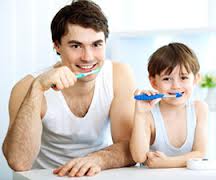Every day we brush our teeth, and still make some usual mistakes. You will know to achieve a proper oral hygiene.
Common Mistakes When Brushing Teeth
Since childhood we know that we must brush our teeth after every meal, before going to sleep and to get up. We do this several times every day of our lives, almost automatically, yet we often make errors. Learn what they are and how to solve them with these tips.
1. Do not brush long enough
Experts recommend brushing teeth at least two minutes each session, one in the morning, before going to sleep, and after every meal. The duration of brushing is a habit that not many fulfill, and is extremely important.
Although the technique is correct, the product and the brush are of the highest quality and is accompanied by complementary actions (use dental floss, mouthwash, etc.), if brushing not hard enough none of these allies can do its work in the appropriate way.
You can sing a song in your mind or read something while brushing, for sure meet the two minutes, but be careful because it could make the next mistake.
Read: How long should we wait to brush our teeth after eating
2. Ignoring brushing
Another common mistake is not paying enough attention to the task of brushing. To correct this, a good idea is to look in the mirror and confirm that we are traveling across the mouth, analyze whether we are brushing too hard, if we notice swelling or bleeding, if our gums are being massaged and covered by the product, etc.
3. Brush in the wrong direction
Remember that the correct technique of brushing movements mixture of top-down and side to side. Complies with these movements for proper hygiene.
4. Brushing too hard
Brushing should be firm yet gentle, while the brush should have a very slight pressure on the teeth, without doing a lot of strength. Brushing too rough cause gum inflammation, bleeding, accelerated deterioration of the toothbrush and simply will not perform the role of hygiene in the best way.
5. Do not use the old brush
Remember that the brush is the most important tool for oral hygiene. Must be renewed every 3 months, by choosing one half of bristles (or soft or hard) of an inch in height, and a head 2 to 2 1/2 inches long or less.
Choose brushes with heads somewhat curved at the end, and slip ergonomic handles, with elements of oral hygiene assistance (as cross bristles), in different lengths, among other benefits.
6. Do not use oral hygiene supplements
In addition to the brush, remember to compliment your oral hygiene flossing (especially in areas of cutting and chewing teeth), a tongue scraper and internal cheeks (can be located in the back of the head) and mouthwash without alcohol and disinfectant effect, making extractions for 50 to 60 seconds after each brushing.
Also make sure you choose the right toothpaste, good quality and natural ingredients.
